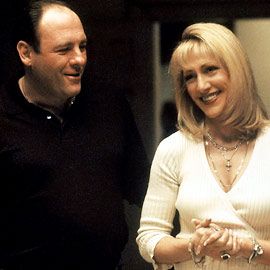
The Sopranos Has Been Labelled the ‘Greatest TV Show of All Time’—Here’s Why
The world of television has evolved dramatically over the years, but there’s one show that consistently stands above the rest: The Sopranos. Labelled by many critics and fans as the “greatest TV show of all time,” this groundbreaking series redefined what television could achieve in terms of storytelling, character development, and thematic exploration.
If you’ve ever wondered what makes The Sopranos so special, you’re in the right place. In this article, we’ll delve into the various reasons why The Sopranos has earned this lofty title. Whether you’re a fan or a newcomer, you’ll see why this show has become a cultural touchstone that continues to influence TV to this day.
A Revolutionary Approach to Storytelling
One of the key factors that set The Sopranos apart from other shows is its groundbreaking narrative style. It didn’t just tell a story about a mob boss—it intertwined the complexities of family life, mental health, power struggles, and even the American Dream, all within the context of the Mafia. Unlike many of its predecessors, which often relied on formulaic plots, The Sopranos took a more nuanced, unpredictable approach to storytelling.
The Complex Anti-Hero: Tony Soprano
At the heart of the show is Tony Soprano (played by the incomparable James Gandolfini), a character who defied the typical image of a mob boss. While he’s ruthless and violent, Tony is also deeply troubled, struggling with anxiety and depression. This complexity allowed the show to delve into the psyche of an anti-hero in a way that had never been done before. Audiences were forced to question: Is Tony a villain? A victim? Or something entirely in between?

Tony’s character evolution is the show’s backbone, and it invites viewers to explore the idea that people are not simply good or evil but rather shaped by their circumstances, choices, and inner demons.
A Look at the Modern American Family
The Sopranos’ portrayal of the Soprano family is nothing short of genius. On the surface, they seem like your typical suburban American family. But dig a little deeper, and you’ll see that the family dynamics are far from ordinary. The Sopranos examines how Tony’s role as both a father and a mafia boss influences every relationship in the household, from his marriage with Carmela to his relationship with his children, Meadow and AJ.
The show explores themes of loyalty, betrayal, power, and the conflict between personal desires and family obligations. What makes it so effective is its ability to show the family’s dysfunction while also creating moments of tenderness and authenticity.
The Sopranos and Mental Health
While The Sopranos is undoubtedly a show about the Mafia, it also tackles the serious topic of mental health in a way that had never been done before in TV dramas. Tony’s sessions with Dr. Melfi (played by Lorraine Bracco) serve as an intriguing backdrop for the exploration of his psyche. Through these therapy sessions, we learn about Tony’s trauma, his struggles with anxiety, and his inability to reconcile his violent, criminal life with his aspirations for normalcy.
The show’s candid portrayal of therapy, mental health, and emotional vulnerability marked a pivotal moment in TV history, allowing it to be seen as both a crime drama and a psychological exploration.
Cinematic Quality: A Visual Feast
Another factor that contributes to the greatness of The Sopranos is its cinematic approach to television. The series is visually stunning, with its lush cinematography, carefully composed shots, and attention to detail. The use of wide shots, close-ups, and deliberate pacing makes each scene feel like a work of art.
By adopting a cinematic style, The Sopranos set a new standard for what television could look like. Directors like David Chase (the show’s creator) worked tirelessly to make every scene feel like it could stand alone as a short film, drawing the viewer into the world of the Sopranos with every frame.
The Importance of Music in The Sopranos
Music played an integral role in creating the show’s atmosphere. From classic rock to contemporary hits, the soundtrack of The Sopranos was meticulously curated to complement the emotional beats of the story. Iconic scenes, such as the famous opening credits, would be incomplete without the hauntingly fitting track “Woke Up This Morning” by Alabama 3.
In fact, music in The Sopranos does more than just set the mood—it helps develop characters, reinforce themes, and highlight emotional moments in ways that dialogue cannot. The show’s soundtrack is as much a part of its legacy as its storytelling.
The Unpredictable Nature of The Sopranos
One of the reasons why The Sopranos is so beloved is its ability to keep viewers on the edge of their seats. While other shows might follow a predictable pattern, The Sopranos thrives on its unpredictability. Plot twists, shocking character arcs, and unexpected deaths kept audiences guessing and eager for the next episode.
The show was never afraid to kill off major characters or radically alter the course of its narrative, a risk that paid off immensely. This unpredictability helped The Sopranos maintain a level of suspense and tension throughout its six seasons, keeping viewers hooked until the very end.
The Impact of The Sopranos on TV
It’s hard to overstate just how much The Sopranos changed the landscape of television. The show didn’t just elevate the standard for storytelling—it also paved the way for the rise of prestige TV. It proved that a television series could be as complex, artistic, and thought-provoking as a feature film, if not more so.
Following the success of The Sopranos, we saw an influx of high-quality television shows that tackled similar themes of morality, family, and power. Shows like Breaking Bad, Mad Men, and The Wire owe a great deal of their success to the groundbreaking work done by The Sopranos.
A Legacy That Lives On
Even though The Sopranos concluded in 2007, its influence is still felt today. The show’s ability to blend humor with violence, character-driven drama with psychological exploration, and mobster thrills with family struggles continues to inspire new generations of creators. Even the phrase “It’s not just a show about the Mafia” has become synonymous with The Sopranos’ ability to transcend its genre and tackle broader themes.
The series’ final episode, which sparked debate and controversy, only added to its mystique, leaving viewers to interpret its ambiguous ending for years to come.
The Sopranos: A Show for the Ages
The Sopranos doesn’t just tell a story—it engages in an ongoing conversation about the nature of morality, identity, and power. Its cultural significance cannot be overstated, and it’s a show that will be remembered and appreciated for decades to come.
As more viewers discover the show through streaming platforms, its influence on popular culture and TV continues to grow. Whether you’re watching it for the first time or revisiting it, The Sopranos remains a cornerstone of modern television.
Conclusion
The Sopranos has firmly earned its place as the “greatest TV show of all time” due to its innovative storytelling, complex characters, cinematic quality, and lasting impact on the TV landscape. It’s a show that doesn’t just entertain; it challenges viewers to think deeply about life, relationships, and the choices we make. The legacy of The Sopranos will continue to inspire creators, critics, and audiences for years to come.
FAQs
1. Why is Tony Soprano considered one of the best TV characters of all time? Tony Soprano is an iconic anti-hero because of his complexity. He’s a mob boss, but he’s also a man struggling with mental health issues and the demands of family life. This duality makes him relatable and unpredictable, making him one of TV’s greatest characters.
2. What is the significance of the final episode of The Sopranos? The final episode is widely discussed for its ambiguous ending, which leaves the fate of Tony Soprano unclear. This open-ended conclusion sparked debates and interpretations that have lasted for years, adding to the show’s mystique.
3. How did The Sopranos impact modern television? The Sopranos helped pave the way for high-quality, character-driven drama on TV. Its mix of complex characters, moral dilemmas, and cinematic presentation set a new standard for storytelling and influenced shows like Breaking Bad and Mad Men.
4. What makes The Sopranos more than just a show about the Mafia? While the show is set in the world of organized crime, it delves much deeper into themes like mental health, family dynamics, and personal identity. It’s a rich exploration of human nature, not just a Mafia drama.